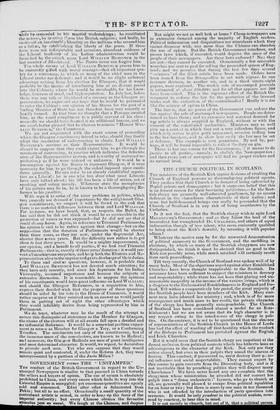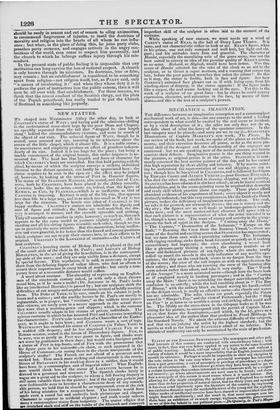THE CHURCH POLITICAL IN SCOTLAND.
THE ministers of the Scottish Kirk appear desirous of rivalling the Church of England parsons as thoroughgoing political agents. They profess that their Church is in danger of being subverted by Popish priests and demagogues : but it surpasses belief that this is an honest reason for their becoming politicians,—for the Scot- tish clergy are generally well-educated gentlemen, by no means deficient in the shrewdness characteristic of their nation ; and none but half-demented beings can really be persuaded that the Church of Scotland is in any risk of being overthrown by the Catholics.
Is it not the fact, that the Scottish clergy wish to spite Lord Mxi.notntsia's Government ; and so they follow the lead of the benevolent but wrongheaded Dr. CHALMERS, and others of equal indiscretion though of less talent, who seem eminently qualified to bring about the Kirk's dowufal, by investing it with popular odium?
Whatever the motive may be for the unwonted demonstration of political animosity to the Government, and the meddling in elections, by which so many of the Scottish clergymen are now distinguished, we think it must be obviod that no good to the Kirk can possibly arise, while much mischief will certainly result from such proceedings.
Till very recently, the Church of Scotland was spoken well of by every body. Most of the objections urged against other Established Churches have been thought inapplicable to the Scottish. Its revenues have been sufficient to support the ministers in decency and respectability; while there has not been that glaring and un- reasonable inequality in the income of the various livings, which is a disgrace to the Ecclesiastical Establishments in England and Ire- land. Till within a comparatively late period, the great majority of the Scottish people have been members of-the Kirk. Many emi- nent men have adorned her ministry ; and, which is of far more consequence and much more to her credit, the private character of the clergy has been generally unimpeachable. The Church of Scotland has been considered almost a model for an Esta- blishment: but we are not aware that its high character is in any respect owing to the interference of the clergy in poli- tics. On the contrary, it is not to be questioned that the absence of representatives of the Scottish Church in the House of Lords has had the effect of warding off that hostility which the conduct of the Bishops in Parliament has provoked against the English and Irish Churches.
But it would seem that the Scottish clergy are impatient at the decent seclusion from political contests which has hitherto been so advantageous to the character of the Kirk. Not only are they active abroad, but even in their pulpits they sound the alarum of faction. This conduct, if persevered in, must destroy their p.:,to- ral influence and social respectability. They cannot expect by this course to gain converts from the Dissenting body, and is it not inevitable that by preaching politics they will disgust many Churchmen ? We have never heard any one complain that the clergyman whose ministration he attended did not convert his pulpit into a " drum ecclesiastic :" laymen, who go to church at all, are generally well pleased to escape from political squabbles for an hour or two; but there is scarcely one man in ten thousand who is not offended by the introduction of party questions into sermons. It would be only prudent in the political zealots, reve- rend by courtesy, to bear this in mind. It is not merel in church but out of it that
a ideal
T6011
should be ready in season and out of season to allay animosities, to recommend forgiveness of injuries, to instil the doctrines of morality and religion into the hearts of all whom he can influ- ence: but when, in the place of doing this, he joins party clubs, preaches party sermons, and engages actively in the angry con- tentions of the world, men cease to respect him personally, and the church to which be belongs suffers injury through his mis- conduct.
In the present state of public feeling it is impossible that any institution can long survive the loss of national respect. A church is only known through its ministers. Its doctrines, true or false, may remain; but an establishment is considered to be something apart from religion—not religion itself, but, as PALEY said, only " a means of inculcating it :" and when they whose duty it is to perform the part of instructors lose the public esteem, then it will soon be all over with that establishment. For these reasons, we think that the recent conduct of the Scottish clergy, not the plots of the Popish priesthood, has really tended to put the Church
Scotland in something like jeopardy.



























 Previous page
Previous page